最新新版新目标英语八级下册unit1知识点总结教程文件
春人教新目标英语八年级下册Unit1重点知识讲解
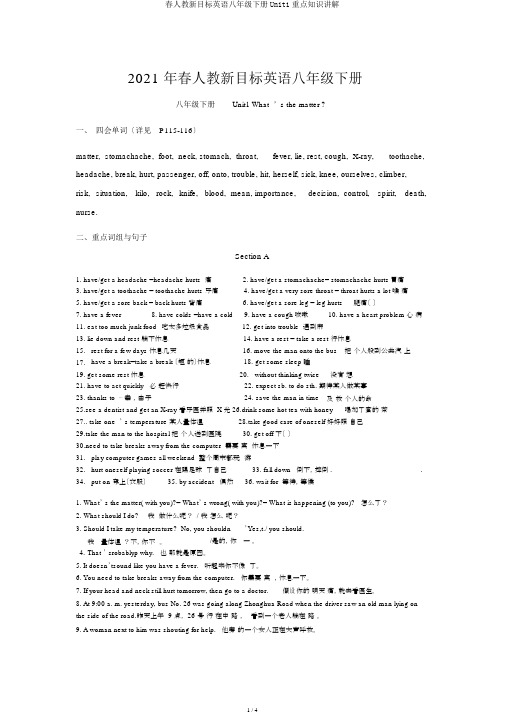
2021 年春人教新目标英语八年级下册八年级下册Unit1 What ’s the matter ?一、四会单词〔详见P115-116〕matter, stomachache, foot, neck, stomach, throat, fever, lie, rest, cough, X-ray,toothache, headache, break, hurt, passenger, off, onto, trouble, hit, herself, sick, knee, ourselves, climber, risk, situation, kilo, rock, knife, blood, mean, importance, decision, control, spirit, death, nurse.二、重点词组与句子Section A1. have/get a headache =headache hurts 痛2. have/get a stomachache= stomachache hurts胃痛3. have/get a toothache = toothache hurts 牙痛4. have/get a very sore throat = throat hurts a lot 喉痛5. have/get a sore back = back hurts 背痛6. have/get a sore leg = leg hurts腿痛〔〕7. have a fever8. have colds =have a cold9. have a cough咳嗽10. have a heart problem 心病11. eat too much junk food吃太多垃圾食品12. get into trouble 遇到麻13. lie down and rest 躺下休息14. have a rest = take a rest行休息15.rest for a few days 休息几天16. move the man onto the bus把个人般到公共汽上17.have a break=take a break 〔短的〕休息18. get some sleep睡19. get some rest 休息20. without thinking twice没有想21. have to act quickly必赶快行22. expect sb. to do sth. 期待某人做某事23. thanks to ⋯幸,由于24. save the man in time及救个人的命25.see a dentist and get an X-ray 看牙医并照 X 光 26.drink some hot tea with honey喝加了蜜的茶27.. take one ’ s temperature某人量体温28.take good care of oneself 好好照自己29.take the man to the hospital 把个人送到医院30. get off 下〔〕30.need to take breaks away from the computer 需要离休息一下31.play computer games all weekend整个周末都玩游32.hurt oneself playing soccer 在踢足球了自己33. fall down 倒下,摔倒 ..34.put on 穿上〔衣服〕35. by accident 偶然36. wait for 等待,等候1. What’ s the matter( with you)?= What’ s wrong( with you)?= What is happening (to you)? 怎么了?2. What should I do?我做什么呢? / 我怎么呢?3. Should I take my temperature? No, you shouldn’Yes,t./ you should.我量体温?不,你不。
英语八年级下册unit1知识点

英语八年级下册unit1知识点英语学习是需要掌握一定的知识点才能更好地理解和运用语言。
本文将介绍英语八年级下册Unit1的重点内容,帮助学生更好地复习学习。
一、动词不定式动词不定式是动词的一种形式,通常由“to”和动词原形共同构成,用途广泛,并且常与其他词语搭配使用。
例如:We like to play basketball.(我们喜欢打篮球。
)He wants to go to the movie theater.(他想要去电影院。
)动词不定式具有动词的特点,可以表示动作或状态,也可以作为名词、形容词或副词的补充,需要灵活运用。
二、情态动词情态动词是一类特殊的助动词,表示说话者的态度、想法、推测、建议等。
英语八年级下册Unit1中常见的情态动词有“can、could、may、might、must、shall、should、will”等。
例如:I can speak English very well.(我能非常好地说英语。
)She should study more.(她应该再多学习一些。
)情态动词的用法比较复杂,需要结合具体语境进行理解,语法规则也有一定的复杂性,需要多加练习。
三、被动语态被动语态是表达主语受到动作影响的动词形式,通常由“be+过去分词”构成,用于强调动作的承受者,常与“by”连用。
例如:The book was written by him.(这本书是他写的。
)The flowers were watered by the girl.(这些花是那个女孩浇的水。
)被动语态在英语表达中应用广泛,需要掌握其构成、用法及注意事项,以便在交际中恰当地运用。
四、形容词与副词比较级和最高级形容词和副词的比较级和最高级形式用于比较不同事物之间的差异和程度等级。
其中,一般情况下,单音节形容词和副词的比较级和最高级结尾加“-er”和“-est”,双音节或多音节形容词和副词则在前面加“more”或“most”。
新目标英语八年级下册Unit1Willpeoplehaverobots知识点
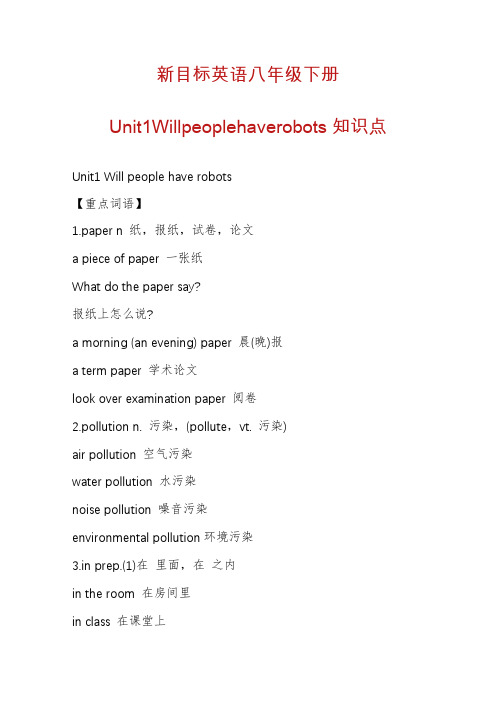
新目标英语八年级下册Unit1Willpeoplehaverobots知识点Unit1 Will people have robots【重点词语】1.paper n 纸,报纸,试卷,论文a piece of paper 一张纸What do the paper say?报纸上怎么说?a morning (an evening) paper 晨(晚)报a term paper 学术论文look over examination paper 阅卷2.pollution n. 污染,(pollute,vt. 污染)air pollution 空气污染water pollution 水污染noise pollution 噪音污染environmental pollution环境污染3.in prep.(1)在里面,在之内in the room 在房间里in class 在课堂上(2)在(某段时间)之间in the morning 在早上in the past 在过去I′ll come back in a day or two我过一两天就会回来in,after,later 接时间段,都可表示“(一段时间)之后”,它们有什么区别呢?①“in+一段时间”指“(将来的)一段时间之后”。
What will you be in five years?五年之后你干什么?We’ll start off in ten minutes.我们十分钟后出发。
②“after+一段时间”或“一段时间+later”表示“(在过去某个时间看来)一段时间之后”。
He went home after two days.他两天后回家了。
Three years later,she had a baby.三年后,她生了一个婴儿。
4.less adj. 较少的;少量的(little的比较级)They buy less beer and fewer cigarettes now现在他们买的啤酒和香烟比以前少了。
人教版(新目标)初中英语八年级下册Unit 1
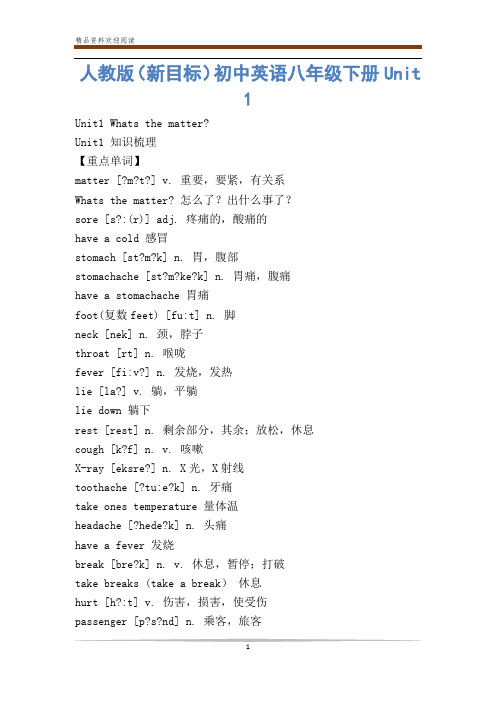
人教版(新目标)初中英语八年级下册Unit1Unit1 Whats the matter?Unit1 知识梳理【重点单词】matter [?m?t?] v. 重要,要紧,有关系Whats the matter? 怎么了?出什么事了?sore [s?:(r)] adj. 疼痛的,酸痛的have a cold 感冒stomach [st?m?k] n. 胃,腹部stomachache [st?m?ke?k] n. 胃痛,腹痛have a stomachache 胃痛foot(复数feet) [fu:t] n. 脚neck [nek] n. 颈,脖子throat [rt] n. 喉咙fever [fi:v?] n. 发烧,发热lie [la?] v. 躺,平躺lie down 躺下rest [rest] n. 剩余部分,其余;放松,休息cough [k?f] n. v. 咳嗽X-ray [eksre?] n. X光,X射线toothache [?tu:e?k] n. 牙痛take ones temperature 量体温headache [?hede?k] n. 头痛have a fever 发烧break [bre?k] n. v. 休息,暂停;打破take breaks (take a break)休息hurt [h?:t] v. 伤害,损害,使受伤passenger [p?s?nd] n. 乘客,旅客off [?f] adv. prep. 离开(某处);从去掉get off 下车to ones surprise 使惊讶,出乎意料onto [nt?] prep. 向,朝trouble [?tr?bl] n. 麻烦,烦扰,问题hit [hit] n. v. 碰撞,打,打击right away 立即,马上get into 陷入,参与herself [h?:?self] pron. 她自己,她本身(she的反身代词)bandage [b?nd?d?] n. v. 绷带;用绷带包扎sick [s?k] adj. 患病的,不适的knee [ni:] n. 膝盖nosebleed [?nzbli:d] n. 鼻出血breathe [bri:e] v. 呼吸sunburned [?s?nb?:nd] adj. 晒伤的ourselves [ɑ:?selvz] pron. 我们自己(we的反身代词)climber [?kla?m?(r)] n. 登山者be used to 习惯于适应于risk [r?sk] n. v. 风险,危险;冒险take risks (take a risk) 冒险accident [ksid?nt] n. 意外事件;事故situation [?sitju?ein] n. 状况,形式,情况kg=kilogram [?k?l?gr?m] n. 公斤,千克rock [r?k] n. 岩石run out (of) 用尽,耗尽knife [naif] n. 刀,餐刀cut off 切除blood [bl?d] n. 血mean [mi:n] v. 意味着,意思是,意欲get out of 离开,从出来importance [?m?p?:tns] n. 重要性decision [d?sn] n. 决心,决定,抉择control [k?ntrl] v. 控制,支配,操纵be in control of 掌管,管理spirit [sp?r?t] n. 勇气,意志death [de] n. 死亡give up 放弃nurse [n?:s] n. 护士【重点短语】1.have a fever 发烧2.have a cough 咳嗽3.have a toothache 牙疼4.talk too much 说得太多5.drink enough water 喝足够的水6.have a cold 受凉;感冒7.have a stomachache 胃疼8.have a sore back 背疼9.have a sore throat 喉咙痛10. take risks 冒险11.hot tea with honey 加蜂蜜的热茶12.see a dentist 看牙医13.get an X-ray 拍X 光片14.take one s temperature 量体温15.put some medicine on sth. 在上面敷药16. give up 放弃17. sound like 听起来像18. all weekend 整个周末19. in the same way 以同样的方式20. go to a doctor 看医生21. go along 沿着走22. on the side of the road 在马路边23. shout for help 大声呼救24. without thinking twice 没有多想25. get off 下车26. have a heart problem 有心脏病27. to one s surprise 另某人惊讶的是28. thanks to 多亏了;由于29. in time 及时30. make a decision 做出决定31. get into trouble 造成麻烦32. right away 立刻;马上33. because of 由于34. get out of 离开;从出来35. keep on doing sth. 继续或坚持做某事36. put a bandage on sth. 用绷带包扎37. fall down 摔倒38. feel sick 感到恶心39. have a nosebleed 流鼻血40. cut his knee 割伤他的膝盖41. put her head back 把她的头向后仰42. have problems breathing 呼吸困难43. mountain climbing 登山运动44. be used to doing sth. 习惯做某事45. run out (of) 用完;用尽46. so that 以便47. so...that... 如此以至于...48. be in control of 掌管;管理49. in a difficult situation 在闲境中【重点句型】1. Whats the matter with you?= Whatthe trouble with you?= Whats wrong with you? 你怎么了?2. What should she do? 她该怎么办呢?3.Should I take my temperature? 我应该量一下体温吗?4.You should lie down and rest. 你应该躺下休息一会儿。
八年级英语下册 Unit 1 What’s the matter知识点总结、作文 (新版)人教新目标
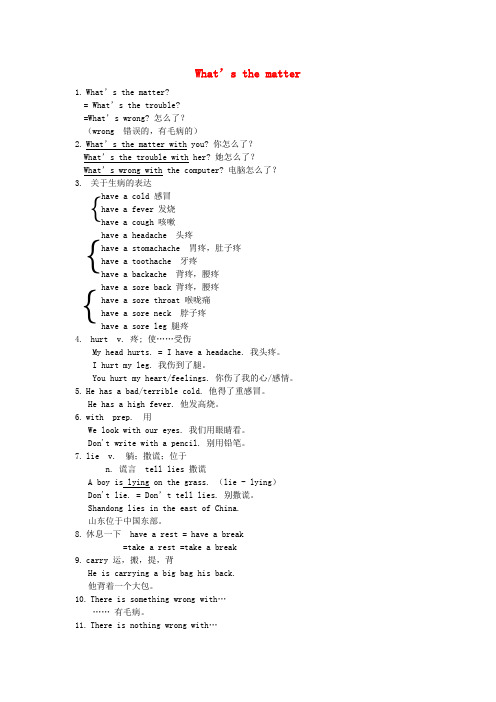
What’s the matter1.What’s the matter?= What’s the trouble?=What’s wrong? 怎么了?(wrong 错误的,有毛病的)2.What’s the matter with you? 你怎么了?What’s the trouble with her? 她怎么了?What’s wrong with the computer? 电脑怎么了?感冒发烧咳嗽头疼胃疼,肚子疼牙疼背疼,腰疼背疼,腰疼喉咙痛脖子疼腿疼疼; 使……受伤My head hurts. = I have a headache. 我头疼。
I hurt my leg. 我伤到了腿。
You hurt my heart/feelings. 你伤了我的心/感情。
5.He has a bad/terrible cold. 他得了重感冒。
He has a high fever. 他发高烧。
6.with prep. 用We look with our eyes. 我们用眼睛看。
Don't write with a pencil. 别用铅笔。
7.lie v. 躺;撒谎;位于n. 谎言 tell lies 撒谎A boy is lying on the grass. (lie - lying)Don't lie. = Don’t tell lies. 别撒谎。
Shandong lies in the east of China.山东位于中国东部。
8.休息一下 have a rest = have a break=take a rest =take a break9.carry 运,搬,提,背He is carrying a big bag his back.他背着一个大包。
10.There is something wrong with………有毛病。
11.There is nothing wrong with………没毛病。
人教新目标八年级英语下册Unit1-Section-A-1a-2d

Conversation 2 Nurse: What’s the matter, David? Are you OK? David: I ate too much junk food at my friend’s
birthday party. So last night, I got a stomachache. I almost couldn’t get myself out of bed this morning.
Unit 1 What’s the matter?
Section A 1a-2d
八年级下册·人教版
Objectives
To learn to talk about health problems and accidents.
To role play the conversation in 2d and learn the key words and phrases in it.
有关疾病、伤害表达法
表示患病:have a(n)+疾病名称 e.g. have a cold have a fever have a cough
have a stomachache have a toothache 某些搭配中还会使用catch,如catch a cold等。
表示身体不适 be/feel+形容词
Conversation 3 Nurse: What’s the matter, Ben? Can you move?
Ben: Not really. I was playing soccer the other day and I hurt myself. It seemed OK at first, but now I have a really sore back.
英语八年级下册m1知识点

英语八年级下册m1知识点英语八年级下册M1是说英语八年级下册的第一模块,这个模块主要是讲述了一些重要的知识点,在这里我们来一一了解一下。
一、动词时态动词时态是英语语言中非常重要的一部分,我们必须掌握好它。
动词时态包括:现在时、过去时和将来时。
现在时表示现在正在发生的事情,过去时表示已经发生了的事情,将来时表示将要发生的事情。
二、被动语态被动语态是一个非常常用的语法形式,它用于表示动作的承受者。
例如:这本书被我借走了。
在这个句子中,“这本书”是承受者,“我”是动作的执行者。
三、宾语从句宾语从句是一个包含在宾语中的子句,它常常作为主句的宾语。
例如:我知道他在做什么。
在这个句子中,“他在做什么”是宾语从句。
四、状语从句状语从句是一个包含在句子中的子句,它通常用来修饰句子中的动词,形容词或者副词。
例如:当我见到他时,他正在做功课。
在这个句子中,“当我见到他时”是状语从句。
五、比较级和最高级比较级和最高级是英语中用来比较两个或多个事物差异的基本形式。
比较级表示两个事物之间的大小或者差异,最高级用来表示三个或多个事物之间的大小或者差异。
六、情态动词情态动词是一组特殊的助动词,它们与其它动词搭配使用,用来表达肯定、否定、建议、请求、可能性、能力等。
例如:我可以帮助你。
在这个句子中,“可以”就是一个情态动词。
以上就是英语八年级下册M1的知识点总结。
我们如果掌握了这些语法规则,就能更好地学习英语,更好地理解和应用英语。
新目标英语八年级下册Unit1 Will people have robots?讲解与练习
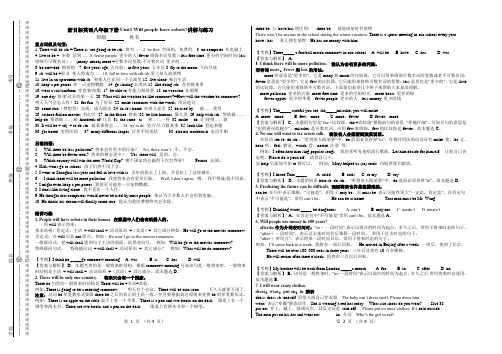
第 1 页 (共4 页) 第 2 页 (共4 页)学校 姓名 班级 考场 考号---------------------------------○密------------------ -------------------○封----------------------------- -- --○线----------------------------※※※※※※※※※※※※※※※答※※※※※※※※※※※※※※※※※※题※※※※※※※※※※※※※※※※线※※※※※※※※※※※※※新目标英语八年级下册Unit1 Will people have robots?讲解与练习班级 姓名重点词组及句型:1. There will be sth.= There is /are going to be sth. 将有……2. be free 空闲的,免费的3. on computer 在电脑上4. live to be + 岁数 活到……5. fewer people 更少的人(fewer 修饰名词复数);less free time 更少的空闲时间(less修饰不可数名词); (many /much) more +可数名词复数/不可数名词 更多的……6. be crowded 拥挤的7. five years ago 五年前;in five years 五年后8. fly to the moon 飞向月球9. sb. will be +职业 某人将成为……10. fall in love with sth./sb.爱上某人或某物11. live in an apartment with sb. 和某人住在同一个公寓里12. live alone 独自生活13. keep a pet parrot 养一只宠物鹦鹉 14. go skating 去滑冰15. like doing sth. 喜欢做某事16. wear a suit\uniform 穿套装\制服 17. be able to 有能力做某事 18. on vacation 在假期19. one day 将来\过去的某一天 20. What will the weather be like tomorrow?=How will the weather be tomorrow?明天天气会怎么样?21. for fun 为了好玩 22. make sentences with the words 用词造句23. come true (梦想等)实现;成为现实 24. in sb's home 在某人家里 25. be used by 被……使用26. science fiction movies 科幻片 27. in the future 将来 28. be like humans 像人类 29. help with sth. 帮助做……help do 帮助做…… 30. hundreds of 几百 31. the same...as... 和……一样 32. make ... do 让\使得……做33. It will be + adj. + to do sth. 做某事将会…… 34. try to do 努力\尽力做某事 35. look like 看起来像36. get bored 变得厌烦 37. many different shapes 许多不同形状 38. electric toothbrush 电动牙刷日常用语:1. ---Will there be less pollution? 将来会有更少的污染?---No, there won’t. 不,不会。
新版新目标英语八年级下册unit1知识点总结
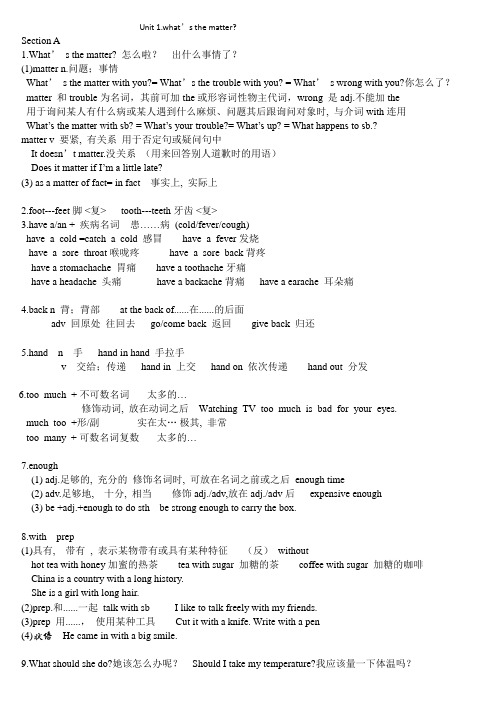
Unit 1.what’s the matter?Section A1.What’s the matter? 怎么啦?出什么事情了?(1)matter n.问题;事情What’s the matter with you?= What’s the trouble with you? = What’s wrong with you?你怎么了?matter 和trouble为名词,其前可加the或形容词性物主代词,wrong 是adj.不能加the用于询问某人有什么病或某人遇到什么麻烦、问题其后跟询问对象时, 与介词with连用What’s the matter with sb? = What’s your trouble?= What’s up? = What happens to sb.?matter v 要紧, 有关系用于否定句或疑问句中It doesn’t matter.没关系(用来回答别人道歉时的用语)Does it matter if I’m a little late?(3) as a matter of fact= in fact 事实上, 实际上2.foot---feet 脚 <复> tooth---teeth 牙齿 <复>3.have a/an + 疾病名词患……病(cold/fever/cough)have a cold =catch a cold 感冒have a fever发烧have a sore throat喉咙疼have a sore back背疼have a stomachache 胃痛have a toothache牙痛have a headache 头痛have a backache背痛have a earache 耳朵痛4.back n 背;背部at the back of......在......的后面adv 回原处往回去go/come back 返回give back 归还5.hand n 手hand in hand 手拉手v 交给;传递hand in 上交hand on 依次传递hand out 分发6.too much + 不可数名词太多的…修饰动词, 放在动词之后Watching TV too much is bad for your eyes.much too +形/副实在太…极其, 非常too many + 可数名词复数太多的…7.enough(1) adj.足够的, 充分的修饰名词时, 可放在名词之前或之后enough time(2) adv.足够地, 十分, 相当修饰adj./adv,放在adj./adv后expensive enough(3) be +adj.+enough to do sth be strong enough to carry the box.8.with prep(1)具有, 带有, 表示某物带有或具有某种特征(反)withouthot tea with honey 加蜜的热茶tea with sugar 加糖的茶coffee with sugar 加糖的咖啡China is a country with a long history.She is a girl with long hair.(2)prep.和......一起talk with sb I like to talk freely with my friends.(3)prep 用......,使用某种工具Cut it with a knife. Write with a pen(4)状语He came in with a big smile.9.What should she do?她该怎么办呢?Should I take my temperature?我应该量一下体温吗?should 应该情态动词, 后跟动词原形, 表示责任和义务should not =shouldn’t 不应该主语+ should/ shouldn’t + 动词原形...take one’s temperature 量体温10.need v 需要用于肯定句是实义动词need情态动词, 仅用于否定结构和疑问句或if/whether引导的宾语从句态动词(1) need sth 需要某物I need your help.(2)人做主语sb need to do sth 某人需要做某事Do you need to drink more water?(3) 物做主语sth need doing sth = sth need to be done 表被动(4) needn’t = don’t have to 没有必要must, need 引导的疑问句肯定回答用Must I hand it in today?No.you ____ .You can do it tomorrow.A.mustn'tB.can'tC.needn'tMust I finish my homework now? No, you ______.You can go home now.A.needn’tB.mustn’tC.shouldn’tD.can’tMust I start now?No, you_______ A.mustn't B.can't C.needn'tNeed I go to school?-- Yes, you must. No, you needn’t.11.I think I sat in the same way for too long without moving.我想我以同样的姿势一动不动地坐得太久了。
新目标英语八年级下unit1知识点总结(问答疾病,状从、宾从)

重点短语1.have a sore back / throat 背部/咽喉疼痛2.have / catch a cold =have the flu 感冒;得了流感3.have a (high)fever 发(高)烧4.have a toothache 牙痛5.have a headache 头疼6.have a stomachache 胃疼;肚子疼7.talk too much谈的太多;too much+不可数名词8.drink enough water喝足够的水;big enough足够大9.lie down and rest 躺下来休息10.take one’s temperature 给某人量体温11.see a dentist and get an X-ray看牙医并做X光透视12.cut oneself 切伤自己;cut off 切除cut it/them off13.put some medicine on it在上面敷些药14.drink some hot tea with honey喝些带蜂蜜的热茶15.take breaks away from 远离……而休息片刻16.see an old man lying on the side of the road看见一位老人正躺在路边(lie)17.shout for help呼救;shout at 向……喊;shout to 嚷18.stop the bus without thinking不假思索地停下车19.get off 下车;get on 上车;get it /them on (off)20.to one’s surprise 使某人惊奇的是21.take sb to sp 带某人去某地22.wait for 等候……can’t wait to do sth 迫不及待地干什么23.agree to do sth同意干什么24.think about oneself为自己考虑think about saving a life考虑挽救一个生命25.hurt oneself doing sth在干某事中伤害自己26.fall down 跌倒;fall off 从……摔下27.have problems doing sth在干某事中有困难have problems breathing呼吸困难28.get sunburned 晒伤29.be interested in 在……感兴趣30.be used to doing sth 习惯于干某事;be used to taking risks31.lose one’s life because of accidents由于事故而丧生32.run out 用完;用光run out of 把……用完33.be ready to do sth愿意迅速做某事get ready for 为……做准备34.so that = in order to do sth 目的干什么35. a book called (call)……一本名叫……的书36.mean being in a difficult situation 意思是在困难的境况下37.get out of 离开;从……出来;下小汽车—get into上小汽车38.tell of the importance of making good decisions 告诉有关做出好决定的重要性的情况39.be in control of 掌管;管理40.keep on doing sth 一直,坚持干某事41.make a decision to do sth.下决心干某事42.Thanks to +名词或代词多亏;幸亏(多放在句首)43.expect sb to do期望某人干什么44.in time 及时;on time 准时at times 有时45.hit sb on the head/ nose ; hit sb in the face.(硬的用on;软的用in)打了某人的头,鼻子;打了某人的脸46.hurt oneself doing sth.在干某事中伤了自己hurt yourself playing soccer 踢足球中伤了自己重点句型1.问毛病:①What’s the matter (with) …?怎么啦?②What’s the trouble (with) …?③What’s wrong with …?④What happened?⑤Is there anything wrong with…?⑥Are you OK?2.回答+建议①I have a cold. You should drink lots of water and rest.②I have a cough and sore throat. You should hot tea with honey.③I have a sore back. You should lie down and rest.④I have a fever. You should take your temperature.⑤I have a toothache. You should see a dentist and get an X-ray.⑥I have a stomachache. You should lie down and rest.You should eat less meat and take more exercise.⑦I cut myself. You should put some medicine on it and put a bandage on it .⑧No, I don’t feel well./ I feel… / I have a … Should I …?You should… / You shouldn’t …3.I think I sat in the same way for too long without moving.我认为我以同样的方式坐了太久而没有运动。
新目标英语八年级下 Unit 1知识要点归纳总结
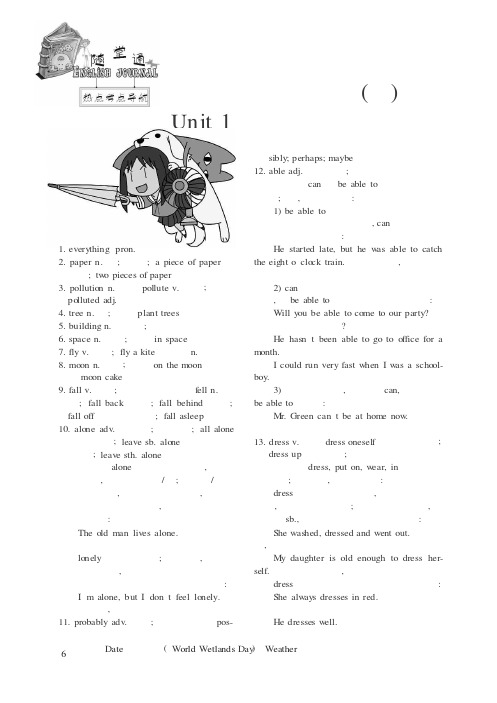
热点考点导航随堂通E N G L I SH J O U R N A L江苏省连云港市花果山中学杨和谦新目标英语八年级(下)Unit 1知识要点归纳总结【单词识记】1.every thing pron.每件事物2.paper n.纸;纸张;a piece of paper 一张纸;tw o pieces of paper 两张纸3.pollutio n n.污染pollute v.污染;弄脏po lluted adj.被污染的4.tree n.树;树木plant trees 植树5.building n.建筑物;房屋6.space n.空间;太空in space 在太空7.fly v.飞行;fly a kite 放风筝n.苍蝇8.mo on n.月亮;月球on the moon 在月球上mo on cake 月饼9.fall v.落下;跌落【过去式】f ell n.跌倒;fall back 后退;fall behind 落后;fall off 从……摔下来;fall asleep 睡着10.alo ne adv .单独地;孤独地;all alone独自一人;leave sb.alo ne 让某人单独留下;leav e sth.alone 听其自然【辨析】alone 既可用作形容词,也可用作副词,意为“单独的/地;独立的/地”。
用作形容词时,习惯上只用作表语,在意义上侧重于“一个人独处”,并不指心灵上的孤独。
例如:The o ld man liv es alone.那位老人独自生活。
lo nely 意为“孤独的;寂寞的”,有较浓厚的感情色彩,指因缺少朋友、同情、友谊时产生的一种悲伤和忧郁的感情。
例如:I ’m alone,but I don ’t feel lo nely.我独自一个人,但不感到孤单。
11.probably adv .大概;或许【同义词】pos-sibly ;perhaps;maybe12.able adj.有能力的;有本事的【辨析】can 和be able to 二者都可以意为“能;会”,其区别在于:1)be able to 的过去时还可以表示一种“经过努力做到某事”的意思,can 的过去时则没有这种意义。
八年级英语下册Unit1单元系统复习知识点归纳人教新目标版
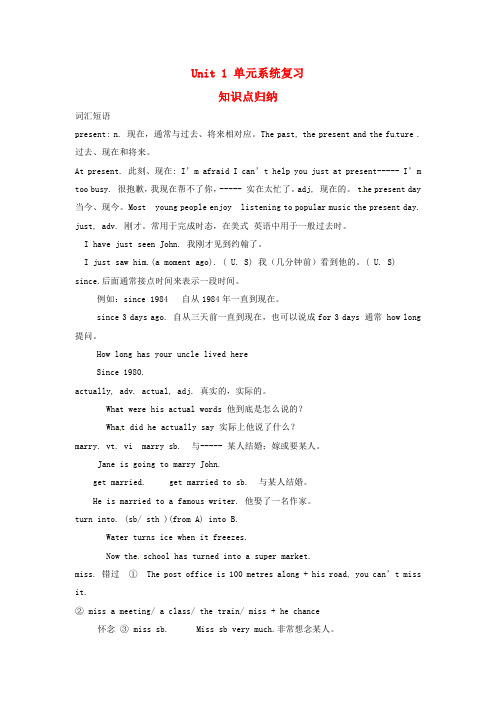
Unit 1 单元系统复习知识点归纳词汇短语present: n. 现在,通常与过去、将来相对应。
The past, the present and the fu ture . 过去、现在和将来。
At present. 此刻、现在: I’m afraid I can’t help you just at present----- I’m too busy. 很抱歉,我现在帮不了你,----- 实在太忙了。
adj, 现在的。
t he present day 当今、现今。
Most young people enjoy listening to popular music the present day. just, adv. 刚才。
常用于完成时态,在美式英语中用于一般过去时。
I have just seen John. 我刚才见到约翰了。
I just saw him.(a moment ago). ( U. S) 我(几分钟前)看到他的。
( U. S) since.后面通常接点时间来表示一段时间。
例如:since 1984 自从1984年一直到现在。
since 3 days ago. 自从三天前一直到现在,也可以说成for 3 days 通常 how long 提问。
How long has your uncle lived hereSince 1980.actually, adv. actual, adj. 真实的,实际的。
What were his actual words 他到底是怎么说的?Wha t did he actually say 实际上他说了什么?marry. vt. vi marry sb. 与----- 某人结婚;嫁或要某人。
Jane is going to marry John.get married. get married to sb. 与某人结婚。
He is married to a famous writer. 他娶了一名作家。
人教新目标八年级英语下册Unit 1 知识点总结
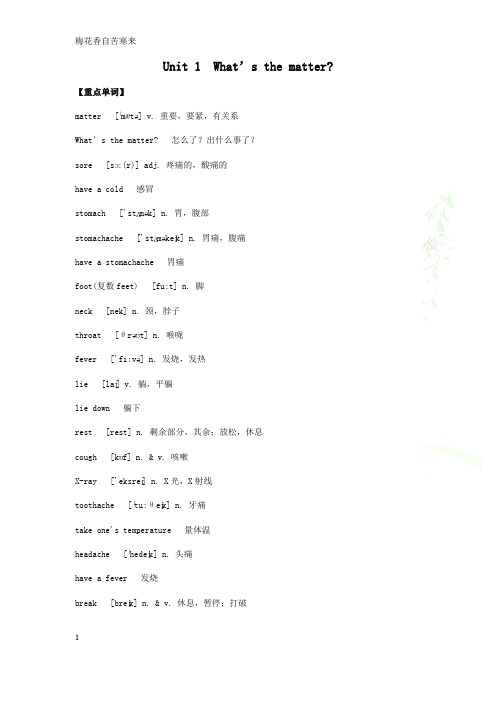
Unit 1 What’s the matter?【重点单词】matter [ˈmætə] v. 重要,要紧,有关系What’s the matter? 怎么了?出什么事了?sore [sɔ:(r)] adj. 疼痛的,酸痛的have a cold 感冒stomach ['stʌmək] n. 胃,腹部stomachache ['stʌməkeɪk] n. 胃痛,腹痛have a stomachache 胃痛foot(复数feet) [fu:t] n. 脚neck [nek] n. 颈,脖子throat [θrəʊt] n. 喉咙fever ['fi:və] n. 发烧,发热lie [laɪ] v. 躺,平躺lie down 躺下rest [rest] n. 剩余部分,其余;放松,休息cough [kɒf] n. & v. 咳嗽X-ray ['eksreɪ] n. X光,X射线toothache [ˈtu:θeɪk] n. 牙痛take one's temperature 量体温headache [ˈhedeɪk] n. 头痛have a fever 发烧break [breɪk] n. & v. 休息,暂停;打破take breaks (take a break)休息hurt [hə:t] v. 伤害,损害,使受伤passenger ['pæsɪndʒə] n. 乘客,旅客off [ɒf] adv. prep. 离开(某处);从…去掉get off 下车to one's surprise 使…惊讶,出乎…意料onto [ˈɒntə] prep. 向,朝trouble [ˈtrʌbl] n. 麻烦,烦扰,问题hit [hit] n. & v. 碰撞,打,打击right away 立即,马上get into 陷入,参与herself [hə:ˈself] pron. 她自己,她本身(she的反身代词)bandage ['bændɪdʒ] n. & v. 绷带;用绷带包扎sick [sɪk] adj. 患病的,不适的knee [ni:] n. 膝盖nosebleed [ˈnəʊzbli:d] n. 鼻出血breathe [bri:ð] v. 呼吸sunburned [ˈsʌnbɜ:nd] adj. 晒伤的ourselves [ɑ:ˈselvz] pron. 我们自己(we的反身代词)climber [ˈklaɪmə(r)] n. 登山者be used to 习惯于… 适应于…risk [rɪsk] n. & v. 风险,危险;冒险take risks (take a risk) 冒险accident [ˈæksidənt] n. 意外事件;事故situation [ˌsitjuˈeiʃən] n. 状况,形式,情况kg=kilogram [ˈkɪləgræm] n. 公斤,千克rock [rɔk] n. 岩石run out (of) 用尽,耗尽knife [naif] n. 刀,餐刀cut off 切除blood [blʌd] n. 血mean [mi:n] v. 意味着,意思是,意欲get out of 离开,从… 出来importance [ɪmˈpɔ:tns] n. 重要性decision [dɪ'sɪʒn] n. 决心,决定,抉择control [kən'trəʊl] v. 控制,支配,操纵be in control of 掌管,管理spirit ['spɪrɪt] n. 勇气,意志death [deθ] n. 死亡give up 放弃nurse [nə:s] n. 护士【重点短语】1.have a fever 发烧2.have a cough 咳嗽3.have a toothache 牙疼4.talk too much 说得太多5.drink enough water 喝足够的水6.have a cold 受凉;感冒7.have a stomachache 胃疼8.have a sore back 背疼9.have a sore throat 喉咙痛10. take risks 冒险11.hot tea with honey 加蜂蜜的热茶12.see a dentist 看牙医13.get an X-ray 拍X 光片14.take one’ s temperature 量体温15.put some medicine on sth. 在……上面敷药16. give up 放弃17. sound like 听起来像18. all weekend 整个周末19. in the same way 以同样的方式20. go to a doctor 看医生21. go along 沿着……走22. on the side of the road 在马路边23. shout for help 大声呼救24. without thinking twice 没有多想25. get off 下车26. have a heart problem 有心脏病27. to one’ s surprise 另某人惊讶的是28. thanks to 多亏了;由于29. in time 及时30. make a decision 做出决定31. get into trouble 造成麻烦32. right away 立刻;马上33. because of 由于34. get out of 离开;从……出来35. keep on doing sth. 继续或坚持做某事36. put a bandage on sth. 用绷带包扎37. fall down 摔倒38. feel sick 感到恶心39. have a nosebleed 流鼻血40. cut his knee 割伤他的膝盖41. put her head back 把她的头向后仰42. have problems breathing 呼吸困难43. mountain climbing 登山运动44. be used to doing sth. 习惯做某事45. run out (of) 用完;用尽46. so that 以便47. so...that... 如此……以至于...…48. be in control of 掌管;管理49. in a difficult situation 在闲境中【重点句型】1. What's the matter with you?= What'the trouble with you?= What's wrong with you? 你怎么了?2. What should she do? 她该怎么办呢?3.Should I take my temperature? 我应该量一下体温吗?4.You should lie down and rest. 你应该躺下休息一会儿。
八年级下册英语一单元知识点归纳总结

八年级下册英语一单元知识点归纳总结Unit 1: Friends。
In the eighth grade English textbook, the first unit focuses on the theme of "Friends". This unit aims to help students understand the importance of friendship, develop effective communication skills, and learn how to maintain healthy relationships with their friends. Throughout this unit, students will explore various aspects of friendship, such as qualities of a good friend, resolving conflicts, and expressing gratitude.1. Qualities of a Good Friend。
A good friend is someone who is trustworthy, loyal, and supportive.Good friends listen attentively and offer advice when needed.They are empathetic and understanding, showing care and concern for each other.Good friends also respect each other's boundaries and privacy.2. Building and Maintaining Friendships。
八下英语第一单元知识点总结归纳
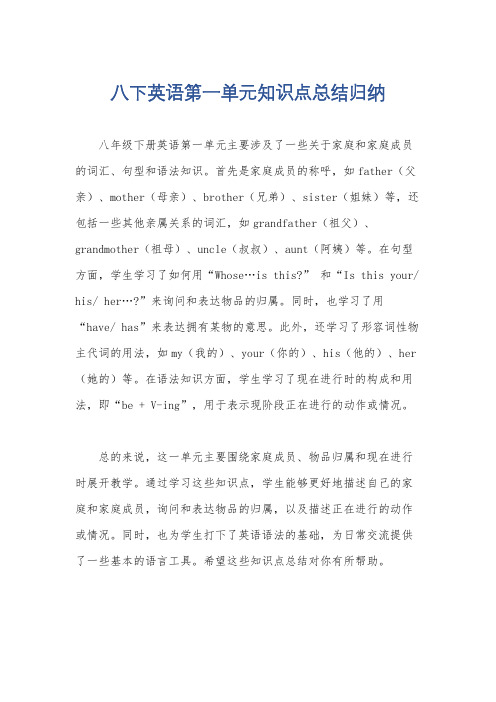
八下英语第一单元知识点总结归纳
八年级下册英语第一单元主要涉及了一些关于家庭和家庭成员的词汇、句型和语法知识。
首先是家庭成员的称呼,如father(父亲)、mother(母亲)、brother(兄弟)、sister(姐妹)等,还包括一些其他亲属关系的词汇,如grandfather(祖父)、grandmother(祖母)、uncle(叔叔)、aunt(阿姨)等。
在句型方面,学生学习了如何用“Whose…is this?” 和“Is this your/ his/ her…?”来询问和表达物品的归属。
同时,也学习了用“have/ has”来表达拥有某物的意思。
此外,还学习了形容词性物主代词的用法,如my(我的)、your(你的)、his(他的)、her (她的)等。
在语法知识方面,学生学习了现在进行时的构成和用法,即“be + V-ing”,用于表示现阶段正在进行的动作或情况。
总的来说,这一单元主要围绕家庭成员、物品归属和现在进行时展开教学。
通过学习这些知识点,学生能够更好地描述自己的家庭和家庭成员,询问和表达物品的归属,以及描述正在进行的动作或情况。
同时,也为学生打下了英语语法的基础,为日常交流提供了一些基本的语言工具。
希望这些知识点总结对你有所帮助。
新目标英语 八年级下册 Unit1-10单元 重点短语+句型
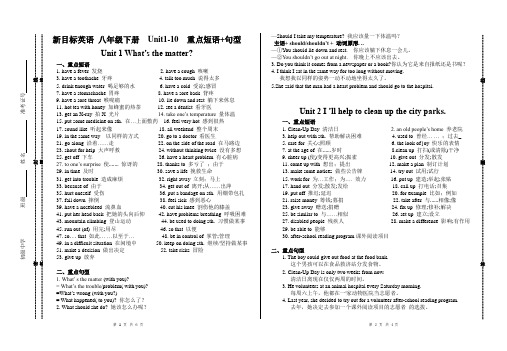
初级中学 班级 姓名 准考证号……………………………密……………………………………………………封…………………………………………线……………………… ……………………………答……………………………………………………题…………………………………………线……………………………………………………答……………………………………………………题…………………………………………线………………………新目标英语 八年级下册 Unit1-10 重点短语+句型Unit 1 What’s the matter?一、重点短语1. have a fever 发烧2. have a cough 咳嗽3. have a toothache 牙疼4. talk too much 说得太多5. drink enough water 喝足够的水6. have a cold 受凉;感冒7. have a stomachache 胃疼8. have a sore back 背疼9. have a sore throat 喉咙痛 10. lie down and rest 躺下来休息 11. hot tea with honey 加蜂蜜的热茶 12. see a dentist 看牙医13. get an X-ray 拍X 光片 14. take one’s temperature 量体温 15. put some medicine on sth. 在…上面敷药 16. feel very hot 感到很热 17. sound like 听起来像 18. all weekend 整个周末 19. in the same way 以同样的方式 20. go to a doctor 看医生21. go along 沿着……走 22. on the side of the road 在马路边 23. shout for help 大声呼救 24. without thinking twice 没有多想 25. get off 下车 26. have a heart problem 有心脏病 27. to one’s surprise 使....... 惊讶的 28. thanks to 多亏了 ;由于 29. in time 及时 30. save a life 挽救生命 31. get into trouble 造成麻烦 32. right away 立刻;马上 33. because of 由于 34. get out of 离开;从……出萍35. hurt oneself 受伤 36. put a bandage on sth. 用绷带包扎 37. fall down 摔倒 38. feel sick 感到恶心39. have a nosebleed 流鼻血 40. cut his knee 割伤他的膝盖41. put her head back 把她的头向后仰 42. have problems breathing 呼吸困难 43. mountain climbing 登山运动 44. be used to doing sth. 习惯做某事 45. run out (of) 用完;用尽 46. so that 以便47. so. . . that 如此… …以至于… 48. be in control of 掌管;管理49. in a difficult situation 在闲境中 50. keep on doing sth. 继续/坚持做某事 51. make a decision 做出决定 52. take risks 冒险 53. give up 放弃二、重点句型1. What’ s the matter (with you)?= What’s the trouble /problem( with you)? =What ’s wrong (with you?)= What happened( to you)? 你怎么了? 2. What should she do? 她该怎么办呢?—Should I take my temperature? 我应该量一下体温吗? 主语+ should/shouldn’t + 动词原形. ..—①You should lie down and rest. 你应该躺下休息一会儿。
新版新目标英语八年级下册unit1知识点总结
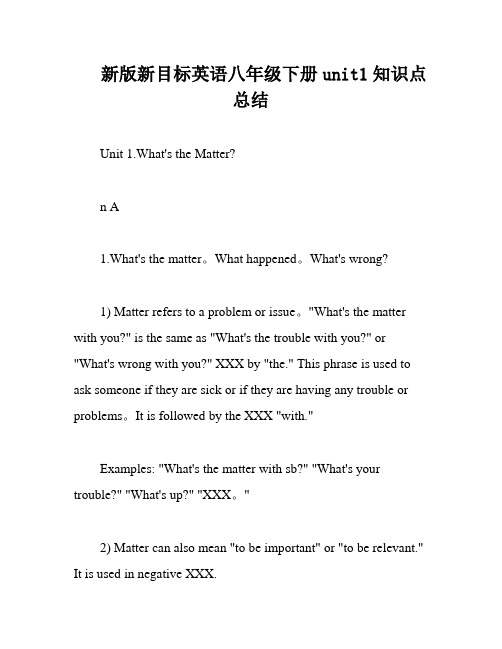
新版新目标英语八年级下册unit1知识点总结Unit 1.What's the Matter?n A1.What's the matter。
What happened。
What's wrong?1) Matter refers to a problem or issue。
"What's the matter with you?" is the same as "What's the trouble with you?" or "What's wrong with you?" XXX by "the." This phrase is used to ask someone if they are sick or if they are having any trouble or problems。
It is followed by the XXX "with."Examples: "What's the matter with sb?" "What's your trouble?" "What's up?" "XXX。
"2) Matter can also mean "to be important" or "to be relevant." It is used in negative XXX.Examples: "It XXX" (This phrase is XXX) "Does it matter if I'm a little late?"3) "XXX "actually."2.Foot (plural: XXX) refers to the part of the body that is used for XXX (plural: teeth) refers to the hard。
英语八年级下册m1知识点总结
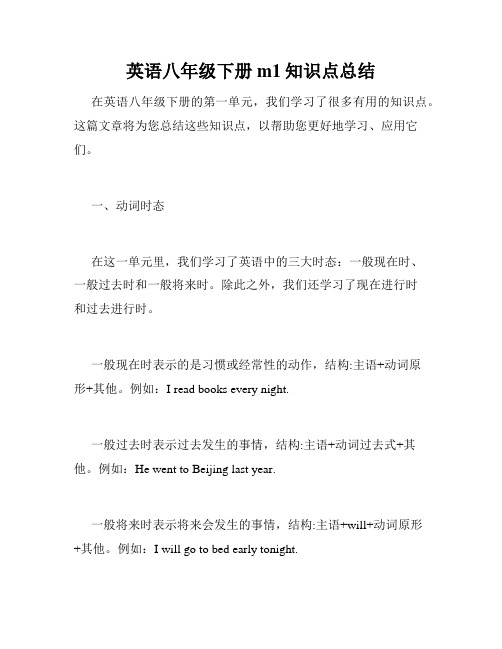
英语八年级下册m1知识点总结在英语八年级下册的第一单元,我们学习了很多有用的知识点。
这篇文章将为您总结这些知识点,以帮助您更好地学习、应用它们。
一、动词时态在这一单元里,我们学习了英语中的三大时态:一般现在时、一般过去时和一般将来时。
除此之外,我们还学习了现在进行时和过去进行时。
一般现在时表示的是习惯或经常性的动作,结构:主语+动词原形+其他。
例如:I read books every night.一般过去时表示过去发生的事情,结构:主语+动词过去式+其他。
例如:He went to Beijing last year.一般将来时表示将来会发生的事情,结构:主语+will+动词原形+其他。
例如:I will go to bed early tonight.现在进行时表示现在正在进行的动作,结构:主语+am/is/are+动词+ing+其他。
例如:We are playing basketball now.过去进行时表示过去正在进行的动作,结构:主语+was/were+动词+ing+其他。
例如:They were watching TV when I arrived.二、被动语态被动语态是在句子中强调做事的对象,而不是做事的人。
它的结构为:主语+be+过去分词+其他。
例如:The cake was eaten by him.三、祈使句祈使句是直接表达命令、要求或建议的句子。
它的结构为:动词原形+其他。
例如:Close the door, please.四、情态动词情态动词是用来表示可能性、能力、意愿等的动词。
在这一单元里,我们学习了can、could、may、might、must、shall、should、will和would等情态动词。
例如:I must finish my homework now.五、名词名词是指人、物、地方等具体的事物,包括可数名词和不可数名词。
我们学习了如何使用单数和复数形式。
【精选】新目标八级英语下册Unit1Whatx27sthematter?短语、语法知识点汇总

人教新目标八年级英语下册Unit 1 What's the matter?一、必背短语Section A 部分1.患感冒have a cold2.胃痛have a stomachache3.喉咙痛have a sore throat4.背痛have a sore back5.躺下休息lie down and rest6.量体温take one’s temperature7.说得太多talk too much8.休息take breaks/a break9.下车get off 10.拍X光片get an X-ray11.看见某人正在做.. see sb. doing 12.反复考虑think twice13.期待某人去做某事expect sb. to do 14.使…惊讶的to one’s surprise15.同意做某事agree to do sth. 16.及时in time17.多亏,由于thanks to 18.陷入困境;惹麻烦get into troubleSection B 部分1.休息几天rest for a few days2.把…放下;低下put…down3.告诉某人做某事tell sb. to do4.告诉某人不要去做tell sb. not to do5.做某事有问题/麻烦/困难have problems/trouble/difficulty (in) doing sth6.对…感兴趣be interested in7.习惯于做某事be used to doing sth8.过去常常做某事used to do sth 9.冒险take risks/a risk10.由于/因为+n./pron. because of 11.处于险境in a dangerous situation 12.处于困境in a difficult situation 13.用尽,耗光run out (of)14.准备/乐于做某事be ready to do 15.切除cut off16.如此…以至于…so…that…17.以便于;为了so that/in order that18.离开;从..出来get out of 19.做决定make decisions/a decision 20.掌控,管理be in control of 21….的重要性the importance of…22.放弃give up 23.用绷带包扎put a bandage on…24.继续做某事keep on doing 25.似乎/好像做某事seem to do【教材内容解析】Section A? (P. 1)1.What’s the matterWhat’s the matter意为“怎么了?出什么事了?”,常用来询问对方遇到什么麻烦或者有什么不顺心的事,后接with sb./sth.表示“某人/某物怎么了” 。
- 1、下载文档前请自行甄别文档内容的完整性,平台不提供额外的编辑、内容补充、找答案等附加服务。
- 2、"仅部分预览"的文档,不可在线预览部分如存在完整性等问题,可反馈申请退款(可完整预览的文档不适用该条件!)。
- 3、如文档侵犯您的权益,请联系客服反馈,我们会尽快为您处理(人工客服工作时间:9:00-18:30)。
Unit 1. what’s the matter?Section A1. What’ s the matter? 怎么啦?出什么事情了?(1)matter n. 问题;事情What’ s the matter with you?= What’s the trouble with you? = What’ s wrong with you?你怎么了?matter 和trouble为名词,其前可加the或形容词性物主代词,wrong 是adj. 不能加the用于询问某人有什么病或某人遇到什么麻烦、问题其后跟询问对象时,与介词with连用What’s the matter with sb? = What’s your trouble?= What’s up? = What happens to sb.?(2)matter v 要紧,有关系用于否定句或疑问句中It doesn’t matter. 没关系(用来回答别人道歉时的用语)Does it matter if I’m a little late?(3) as a matter of fact= in fact 事实上, 实际上2.foot---feet 脚 <复> tooth---teeth 牙齿 <复>3.have a/an + 疾病名词患……病(cold/fever/cough)have a cold =catch a cold 感冒have a fever发烧have a sore throat喉咙疼have a sore back背疼have a stomachache 胃痛have a toothache牙痛have a headache 头痛have a backache背痛have a earache 耳朵痛4. back n 背;背部at the back of......在......的后面adv 回原处往回去go/come back 返回give back 归还5. hand n 手hand in hand 手拉手v 交给;传递hand in 上交hand on 依次传递hand out 分发6.too much + 不可数名词太多的…修饰动词,放在动词之后Watching TV too much is bad for your eyes.much too +形/副实在太…极其,非常too many + 可数名词复数太多的…7.enough(1) adj. 足够的,充分的修饰名词时,可放在名词之前或之后enough time(2) adv. 足够地,十分,相当修饰adj./adv,放在adj./adv后expensive enough(3) be +adj. +enough to do sth be strong enough to carry the box.8.with prep(1)具有,带有, 表示某物带有或具有某种特征(反)withouthot tea with honey 加蜜的热茶tea with sugar 加糖的茶coffee with sugar 加糖的咖啡China is a country with a long history.She is a girl with long hair.(2)prep. 和......一起talk with sb I like to talk freely with my friends.(3)prep 用......,使用某种工具Cut it with a knife. Write with a pen(4)状语He came in with a big smile.9. What should she do?她该怎么办呢?Should I take my temperature?我应该量一下体温吗?should 应该情态动词,后跟动词原形,表示责任和义务should not =shouldn’t 不应该主语+ should/ shouldn’t + 动词原形. ..take one’s temperature 量体温10.need v 需要用于肯定句是实义动词need情态动词,仅用于否定结构和疑问句或if/whether引导的宾语从句态动词(1) need sth 需要某物I need your help.(2)人做主语sb need to do sth 某人需要做某事Do you need to drink more water?(3) 物做主语sth need doing sth = sth need to be done 表被动(4) needn’t = don’t have to 没有必要must, need 引导的疑问句肯定回答用Must I hand it in today?No. you ____ .You can do it tomorrow.A. mustn'tB. can'tC. needn'tMust I finish my homework now? No, you ______. You can go home now.A. needn’tB. mustn’tC. shouldn’tD. can’tMust I start now?No, you_______ A. mustn't B. can't C. needn'tNeed I go to school?-- Yes, you must. No, you needn’t.11.I think I sat in the same way for too long without moving.我想我以同样的姿势一动不动地坐得太久了。
without doing sth. 没有做某事、没做某事I let the day away without doing anything at all. 我一点事也没干就让一天过去了。
The storm passed off without doing much damage.暴风雨过去了,没有造成多大灾害。
12. lie/lai/v. (lay/lei/ ) 躺;平躺lie → lay → lain v 躺卧(现在分词lying ).lie → l ied → l ied v 撒谎(现在分词lying ).lay→ l aid →l aid v 下蛋,产卵(现在分词laying ).lie down 躺下lie down and rest 躺下休息13. neck n.颈;脖子neck and neck 不分上下,势均力敌hurt v. 使痛;受伤表示肉体感到疼痛或不适,使用时应用疼痛的具体部位作主语。
My leg hurts.14. see (saw , seen)v 看见see sb. do sth 看见某人做某事(看到动作发生的全过程或经常看到动作发生,强调整个过程)see sb. doing sth 看见某人正在做某事(强调动作正在发生)15. along/ down相同点:prep 顺着;沿着不同点:along 强调顺着水平方向down 指“沿着……下坡或者往南走16. get on--get off 上下大型交通工具(bus, train, plane)get into—get out of 进入/出来小型交通工具(car, taxi,lift)get up起床get back回来;取回get over克服;度过get on/along well with与……相处融洽get in a word插话get to到达17.have to 客观需要don’t have to不需要must主观必要mustn’t 不准,禁止have to多种时态,有单三18.surprise(1) v 使吃惊→surprising adj.令人吃惊的→surprised adj. 吃惊的surprise sb 使某人吃惊The bad news surprised me.be surprised at 对……感到吃惊be surprised to do sth 做某事而感到惊讶be surprised + that从句因...而惊讶(2) n 惊讶to one’s surprise 使某人吃惊的是in surprise 吃惊地to one’s joy/disappointment/satisfacation19.agree v→ (反)disagree – agreement n同意(1) agree with sb. 同意某人I agree with you. (2) agree to do sth 同意做某事(3) agree on sth20. thanks to 多亏;由于(1)thanks to习语介词,thanks不可改为thank you,to后也不接动词原形,to表示感谢的对象(2)thanks for 因……而感谢,for强调为何而感谢,其后可接名词或v-ing(3) Thanks=thank you21.on time 准时in time 及时on time=at exactly the right time. 准时(在规定的时间之内)强调与某个时刻一致in time = with enough time to spare/ not late 及时(恰在时间点上)表示动作在规定时间内或比规定时间提前发生at times=sometimes 有时have a good time 玩得高兴have time =be free 有空all the time 一直at the same time 同时by the time 到……时候for the first time 第一次It’s time to do sth =It’s time for sth 是该做某事的时间了It takes sb. some time to do sth 做某事花费某人多长时间sat once “立刻;马上”;on time“按时”;by accident“偶然”;at present“目前;现在”。
22.trouble/'trʌbl/n .问题;苦恼get into trouble造成麻烦(或烦恼)be in trouble 处于困境中have trouble (in) doing sth做某事有困难That is a monkey on his back. Let’s help him. C 沉重负担A. He has a monkeyB. He likes playing with the monkyC. He is in troubleD. He is good at studying23. 反身代词(1)反身代词的构成(2)反身代词的常见搭配:enjoy oneself=have fun =have a good time玩得高兴teach oneself=learn …by oneself 自学by oneself =alone 独自help oneself to 随便吃introduce oneself to 自我介绍(3)反身代词必须与主语保持人称的一致。
